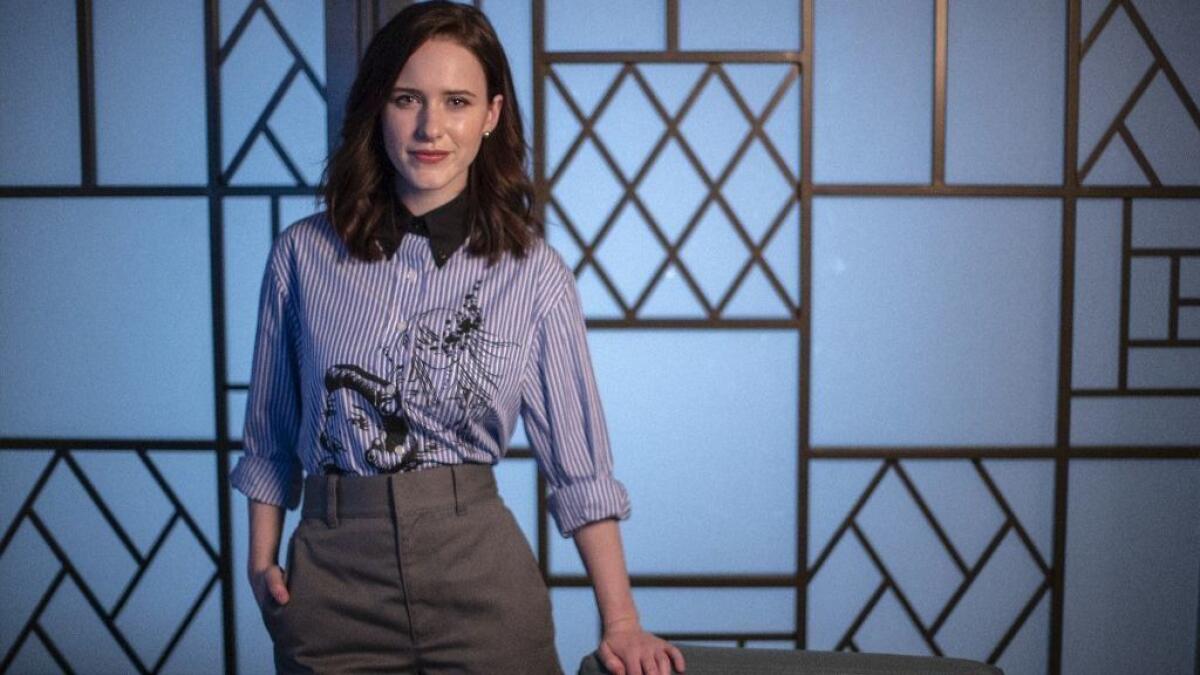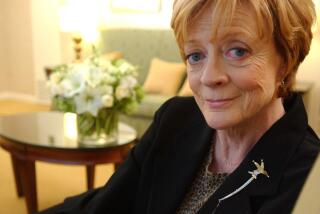Rachel Brosnahan infuses her ‘Mrs. Maisel’ with fearlessness, even when it’s misguided

Rachel Brosnahan, the Golden Globe-winning lead actress of “The Marvelous Mrs. Maisel,” has a good strategy when it comes to judging her own work, and it’s maybe not that unique but somehow Brosnahan’s naturally self-deprecating demeanor makes it sound refreshingly blunt.
“I don’t think you ever know that something works until you’ve seen it cut together. Personally, I’m not sure I ever leave a scene being like, ‘Nailed it.’ That’s just not really how I go,” Brosnahan says. “I mostly leave scenes like, ‘I’ve ended my whole career. I’ll never work again.’”
That perspective makes a lot of sense since the 27-year-old considered herself strictly a dramatic actress, having appeared in films such as “Beautiful Creatures” and a memorable, Emmy-nominated run on Netflix’s “House of Cards,” before landing the role in Amazon Prime’s breakout comedy program.
“One of the things that people say all the time, that working on a film set is a lot of hurry up and wait ... we don’t do so much of that on this show,” the actress says while on a break early this spring at the London West Hollywood. “We really just go. We go and go and go, and so it helps keep up the pace and the energy of the show on-screen too. We talk faster than most people talk. To fill an hour of television, there are about 15 more pages of dialogue.”
In Amy Sherman-Palladino’s critically acclaimed series, Brosnahan plays Miriam “Midge” Maisel, a seemingly content late-1950s New York City housewife who, much to the dismay of her philandering husband (Michael Zegen) and parents (Tony Shalhoub, Marin Hinkle), discovers she has an unexpected talent for stand-up comedy.
Her exploration of this gift inevitably leads to a series of career ups and downs. One memorable scene finds Brosnahan impressively depicting a terribly botched set thanks to the stomach-churning horror of Midge’s cockiness and her decision to ignore the advice of her manager (Alex Borstein).
“I’ve got no experience with stand-up at all, and fortunately, that’s a parallel journey with Midge,” Brosnahan says. “Maybe she starts out as a funnier woman than I am naturally, but Midge is not a comedian when you meet her, and so the time she bombs, she’s still not a stand-up. And that’s why she bombs. She hasn’t practiced. She doesn’t have a set. She’s just talking.”
Because the stand-up scenes were so important to the show, they were purposely filmed at the beginning of each episode’s production cycle. This one for the pilot episode in which she takes the stage while drunk began filming at 6 a.m.
“It was not the greatest idea I ever had, but you know when you’re really drunk and you can taste alcohol in your mouth, even when you’re not drinking? I was taking just teeny, teeny, tiny sips of wine out of a cup while we were shooting [to recreate that feeling]. I mean teeny sips, just to get that taste in my mouth,” she recalls. “But after enough takes and enough teeny sips, I was like — I was not even close to drunk, not buzzed, either, just to clarify — more like, ‘Bleh, it was too early to start drinking wine.’”
All I remember is Alex Borstein going, ‘Don’t … it up,’ but I’m pretty sure she said that before every stand-up scene, so I’m not sure that one was unique.
— Rachel Brosnahan
She adds, “All I remember is Alex Borstein going, ‘Don’t … it up,’ but I’m pretty sure she said that before every stand-up scene, so I’m not sure that one was unique.”
Consequently, one of the most compelling aspects of Midge’s character is how Sherman-Palladino and Brosnahan have crafted her fearlessness. While those around her question her choices, for the most part, she moves forward with a fearlessness that is wonderfully self-assured.
“Some of that comes from a naive place, some of that comes from a sheltered and privileged place, and some of that’s something you’re born with,” Brosnahan says. “She’s not a passive player, but she is reacting to all kinds of new stimulus, to ideas and people and places and things that she doesn’t understand, and that’s what fuels her stand-up.”
There were many women forging their own path during this period, but few in comedy and few from the picture-perfect world Midge’s family has crafted in upper-middle-class Manhattan.
“You didn’t see women being autonomous, or outwardly ambitious, openly ambitious,” she notes. “That wasn’t socially acceptable, and that’s maybe her biggest act of resistance.”
WATCH: Video Q&A’s from this season’s hottest contenders »
More to Read
From the Oscars to the Emmys.
Get the Envelope newsletter for exclusive awards season coverage, behind-the-scenes stories from the Envelope podcast and columnist Glenn Whipp’s must-read analysis.
You may occasionally receive promotional content from the Los Angeles Times.







